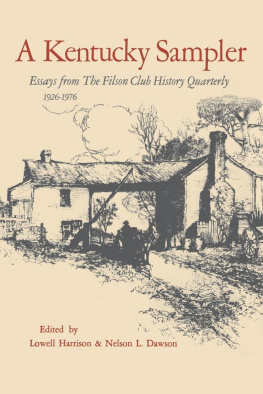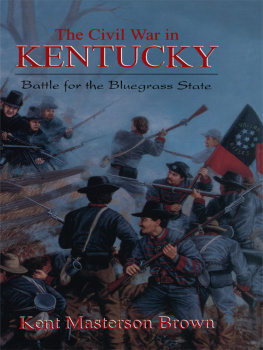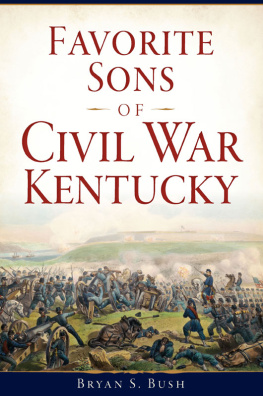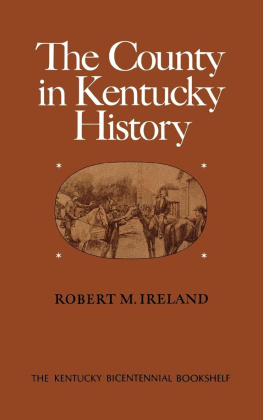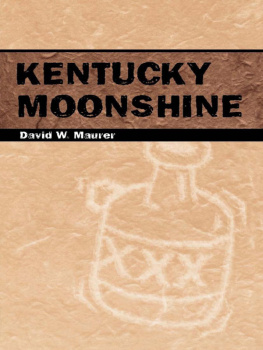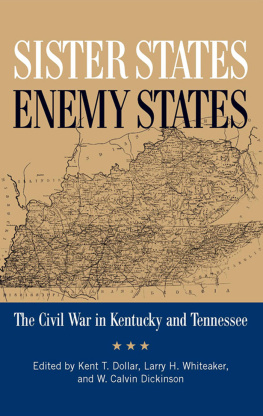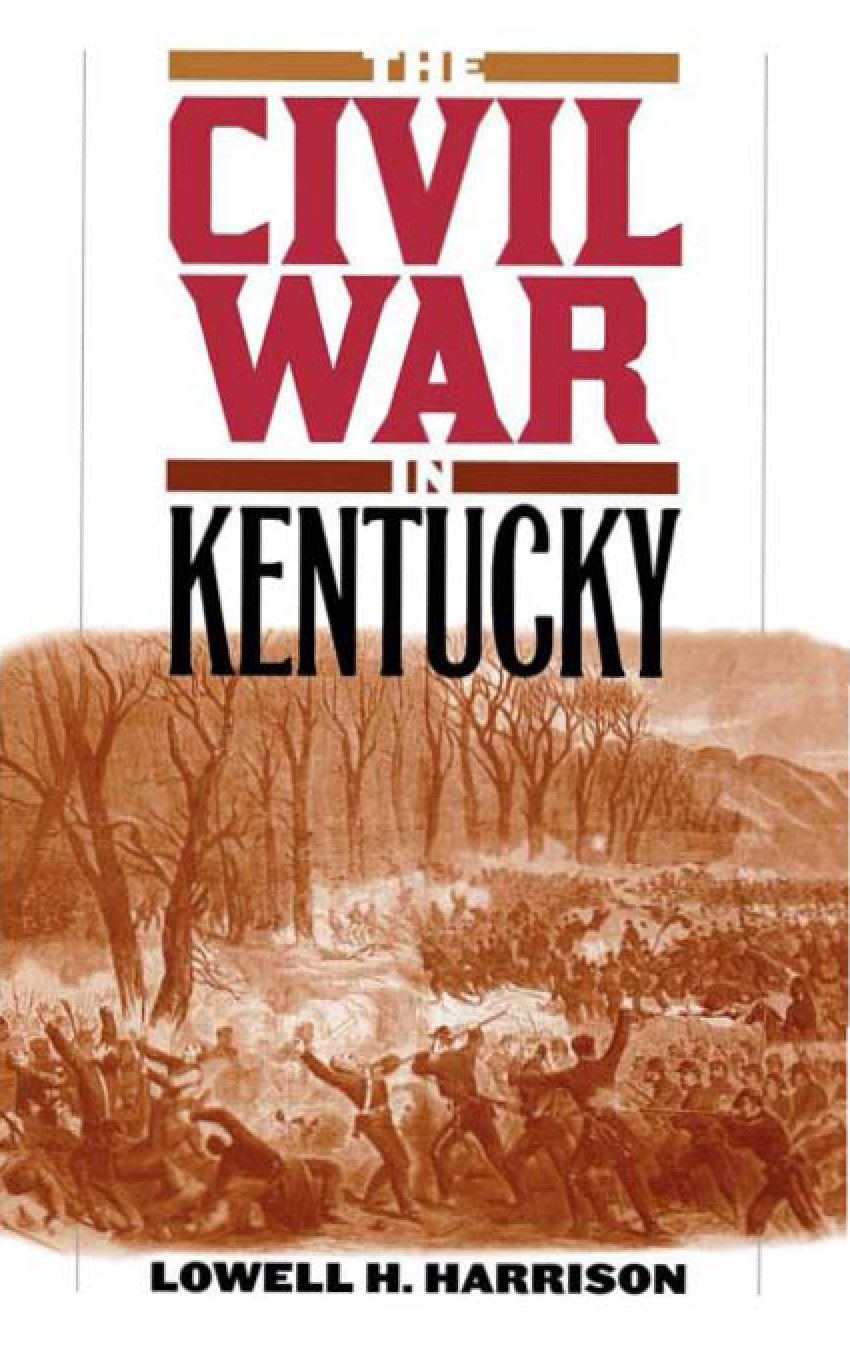Contents
Page List
Guide
THE CIVIL WAR IN KENTUCKY
The Civil War In Kentucky
LOWELL H. HARRISON
THE UNIVERSITY PRESS OF KENTUCKY
The Civil War in Kentucky was originally published in The Kentucky Bicentennial Bookshelf.
Copyright 1975 by The University Press of Kentucky Paperback edition 2009
The University Press of Kentucky Scholarly publisher for the Commonwealth, serving Bellarmine University, Berea College, Centre College of Kentucky, Eastern Kentucky University, The Filson Historical Society, Georgetown College, Kentucky Historical Society, Kentucky State University, Morehead State University, Murray State University, Northern Kentucky University, Transylvania University, University of Kentucky, University of Louisville, and Western Kentucky University.
All rights reserved.
Editorial and Sales Offices: The University Press of Kentucky
663 South Limestone Street, Lexington, Kentucky 40508-4008
www.kentuckypress.com
ISBN: 978-0-8131-9247-5
Library of Congress Catalog Card Number: 79-56829
This book is printed on acid-free recycled paper meeting the requirements of the American National Standard for Permanence of Paper for Printed Library Materials.
Manufactured in the United States of America
| Member of the Association of American University Presses |
To my parents
Contents
Maps
Preface
T HE CIVIL WAR was one of the most important events in American history. Although studied intensively for more than a century, it continues to fascinate and bewilder those who examine its myriad aspects. Even today there is no general agreement on why a country that prided itself upon its pragmatic politics could find no solution for its problems except a long and bloody fraternal war that cost more lives than any conflict in the nations history. When that war came, Kentucky was truly a border state with strong attachments both north and south. In her anguish over the separation, Kentucky adopted a unique policy of neutrality that lasted for several months. When she did cast her fate with the Union cause, a group of her citizens formed a rival government that was admitted into the Confederacy. It is the purpose of this brief essay to review the struggle over secession and neutrality, to look at the course of the war within the commonwealth, and to suggest some of the effects the war had on the state and its citizens.
Two main considerations have established the limits of the survey. First, the compact format of the Bicentennial Bookshelf necessitates a great deal of generalization and summation and all too many omissions; it also precludes extensive documentation. Second, the subject of the survey is The Civil War in Kentucky, not Kentucky in the Civil War, which is a quite different and much broader topic. Only occasionally, therefore, have I ventured outside the boundaries of the commonwealth, although that limitation meant that I had to ignore the Civil War contributions of tens of thousands of Kentuckians who fought for the Union or the Confederacy far from their native state.
I have long been interested in the Civil War, and my research has extended over many years and into many libraries. The collections of the Kentucky Historical Society have been of great use, although during the preparation of this particular volume an extensive remodeling program has rendered them less accessible than in years past. I am especially grateful to the staffs of The Filson Club, the Louisville Free Public Library, the Special Collections of the Margaret I. King Library at the University of Kentucky, and the Kentucky Library at Western Kentucky University.
1
A STATE DIVIDED
A S THE SECTIONAL controversy moved along the path that led to secession and civil war, Kentucky occupied an extremely difficult position. Her citizens were sorely divided in their attitudes toward the problems for which the country was unable to find peaceful solutions. The public knew of family differences that divided such noted clans as the Breckinridges and the Clays; similar divisions split less well known families from the Jackson Purchase to the eastern mountains. Samuel McDowell Starling, a slaveholder from Hopkinsville, opposed secession so strongly that he volunteered for Union military service although he was past fifty years of age; he lost one son in Confederate service and another who died fighting for the Union. Such tragedies were repeated many times across the state.
Slavery was one of the institutions that bound Kentucky to the South. Slaves had been brought into the state since the early days of settlement, and in 1860 they constituted 19.5 percent of the population. But the percentage had been decreasing for several decades, and the state had few large slaveholders when measured by the standards of the Lower South. Many Kentuckians who cherished the Union saw nothing wrong with slavery.
A profitable trade association also bound Kentucky to the states lying to the south. For many years the major outlet for her surplus produce had been the Mississippi River and its tributaries. The advent of railroads, however, created new commercial associations with the North that diminished the importance of the river traffic.
With the famed Kentucky Resolutions of 1798 and 1799 Kentucky had given the nation one of its first and most important expositions of the states rights doctrine which, carried to its extreme, condoned the secession of a state from the Union. Yet her citizens had participated proudly in wars against Great Britain and Mexico, and most Kentuckians had endorsed the efforts of Henry Clay to find solutions to the controversies that threatened the existence of the nation they loved.
Sentimental ties to Virginia, from which Kentucky had been formed in 1792, and to North Carolina and Tennessee, each also the ancestral home of many Kentuckians, were strong. Yet these ties were countered by a new tug toward the free states, where tens of thousands of Kentuckys children lived by 1860.
Kentucky was relatively more important in 1860 than she has been in the twentieth century. Her population then ranked ninth in the nation, and she occupied seventh place in the value of farms and fifth in the value of livestock. Her diversified agriculture supplied vast quantities of tobacco, corn, wheat, hemp, and flax; and the superiority of Bluegrass whiskey was generally recognized, regardless of other sectional disputes. Manufacturing lagged well behind agriculture in the states economy, but in 1860 Kentucky ranked fifteenth in both capital invested in manufacturing and the annual value of products; she was thirteenth in the cost of raw materials used in her industries.
The states geographical location was of great strategic importance. Her accession to the South would give the Confederacy a defensible river boundary and one along which Confederate armies would pose the threat of a drive to the Great Lakes that could split the Union. No one recognized this significance of the commonwealth more clearly than Abraham Lincoln. I think to lose Kentucky is nearly the same as to lose the whole game, he wrote a friend in September 1861. Kentucky gone, we cannot hold Missouri, nor, as I think, Maryland. These all against us, and the job on our hands is too large for us. We would as well consent to separation at once, including the surrender of the capital.


